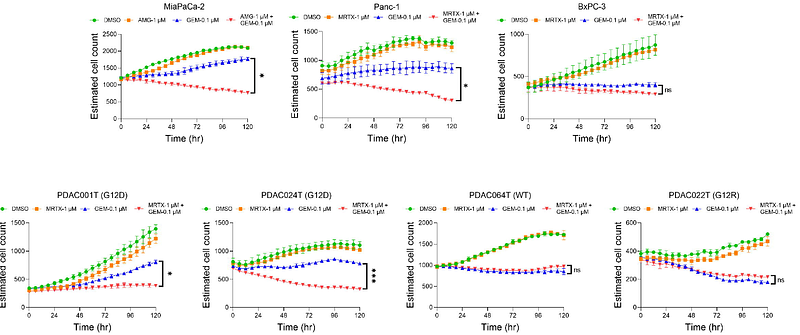KRAS Inhibition Reverses Chemotherapy Resistance Promoted by Therapy-Induced Senescence-like in Pancreatic Ductal Adenocarcinoma

KRAS Inhibition Reverses Chemotherapy Resistance Promoted by Therapy-Induced Senescence-like in Pancreatic Ductal Adenocarcinoma
Meilerman Abuelafia, A.; Santofimia-Castano, P.; Estaras, M.; Grasso, D.; Chuluyan, E.; Lomberk, G.; Urrutia, R.; Dusetti, N.; Fraunhoffer, N.; Iovanna, J.
AbstractBackground: Emerging evidence suggests that chemotherapy can accumulate senescent-like cells within tumor tissues, a phenomenon linked to therapy resistance. The aim of this study is to analyze the senescence-like state of after-treatment persistent cells associated with KRAS mutational status to offer a therapeutic strategy to target these cells in pancreatic ductal adenocarcinoma (PDAC). Experimental Design: Three commercial cell lines and five patient-derived primary cell cultures with different KRAS statuses were studied following gemcitabine treatment. Senescence-like status was assessed using SA-{beta}-gal, together with cell cycle regulators such as p21. Additionally, KRAS mutations were modulated using MRTX1133 and AMG-510, and the signaling pathways ERK and AKT were analyzed and modulated in vitro. Finally, p21 expression, associated with the senescence-like state, on patient outcomes and treatment response was analyzed in publicly available bulk RNA-seq and single-nucleus datasets. Results: We observed an overexpression of p21 alongside an increase in SA-{beta}-gal signal in response to gemcitabine treatment, indicating the induction of a senescence-like state. Specific inhibition of KRAS G12D or G12C mutations reduced SA-{beta}-gal signal and sensitized PDAC cells to gemcitabine. Moreover, ERK inhibition but not AKT inhibition decreased SA-{beta}-gal signal. Additionally, we characterized p21 expression levels in relation to patient outcomes and found that they are modulated by treatment. Conclusions: This dual-targeted therapeutic strategy holds promises for overcoming the challenges posed by KRAS-driven cancers, particularly in addressing the formidable obstacle of pancreatic cancer.